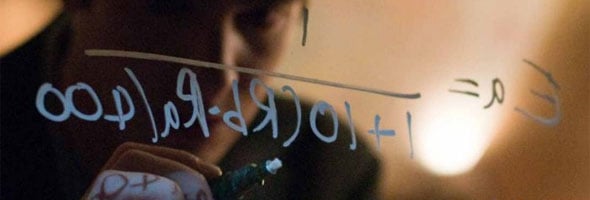I am the same age as Mark Zuckerberg. This means nothing to me personally, or at least didn't until I saw The Social Network, the movie that both captures and decries our generation as defined by Zuckerberg's invention. Without ever painting in broad strokes or stretching for meaning, director David Fincher and screenwriter Aaron Sorkin-- an ideal pairing if there ever was one-- examine the false promises of these lives lived online through the lens of the boy who made it possible. Mark Zuckerberg's story is wholly unique, and yet from the hazy dorm room beginnings to the empty corporate present, his story stands as a symbol for all of us who pour ourselves into Facebook, rearranging pixels to make ourselves look and feel better but logging off remaining, irrevocably, our same selves.
The film begins like a starter pistol, a rapid-fire conversation between a college-aged boy (Zuckerberg, played by Jesse Eisenberg) and girl (Erica Albright, played by Rooney Mara) in which the socially stunted Mark destroys the nascent relationship with a series of insults delivered at an astonishing speed. The conversation doesn't just drop you seamlessly into Fincher and Sorkin's murky, socially fraught world of Harvard in 2003-- the recent past dripping with surprisingly effective nostalgia-- but gives you Mark Zuckerberg in whole: smart, ruthless, unfiltered, unaware of his power until he wields it with blunt force.
Erica is right to break up with him, and Mark may know it, but instead he lashes out with a vicious blog and then a trickier invention, a site where all Harvard girls can be compared side-by-side, allowing anyone on campus to rank the hotness of their classmates and friends. Because it involves hacking and not a small amount of sexism the site gets Mark into trouble, but it also gets the attention of wealthy twin superhunks Cameron and Tyler Winklevoss (both played by Armie Hammer in a bit of CGI wizardry) and their business partner Divya Narendra (Max Minghella), who are developing a site that sounds a lot like what Facebook would become. Mark meets with the guys but blows them off as he teams up with best pal Eduardo Saverin (Andrew Garfield) to develop his own, better idea: The Facebook.
Several years later, in two different glass-walled lawyer's offices so different from wood-paneled Harvard, everyone mentioned in that previous paragraph is suing Mark. The Social Network is the story of how that happened, told in flashbacks and snippets and a climactic rowing race, pieced together from lawyer records and personal accounts from probably everyone but Zuckerberg himself. It's astonishing enough that Fincher and Sorkin have spun a compelling story from these dry technical details, but the movie is such a marvel because it's a heartbreaker too, more than anything a story about how ambition and envy destroyed a friendship almost by accident.
Because though the film serves as a fascinating portrait of Zuckerberg, and though Jesse Eisenberg centers the entire film with his restrained and inscrutable performance, it's the friendship between Mark and Eduardo that provides the movie's soul. The forces that drove apart the Facebook co-founders were pretty typical-- different goals for the site, different plans for where to live, and an extremely persuasive funder (Justin Timberlake's brilliantly suave Sean Parker) with big ideas-- but though these boys are uncommonly smart, they hurt like the rest of us. One of the film's most powerful moments doesn't involve Trent Reznor's glorious and haunting score or Sorkin's nonstop dialogue, but the expression on Garfield's and Eisenberg's faces when Mark asks Eduardo to come back to California after a fight. It's not just that the two actors are wide open yet perfectly measured, balancing the vulnerability and bravado of youth with an eerie ease. It's that their emotions are so real and damned familiar, and that even would-be titans fall victim every time to the same flaws and selfish wishes we pretend aren't there when we edit our Facebook profiles.
There's no disputing that Mark Zuckerberg overstepped the bounds of common courtesy and ethics when building Facebook, but The Social Network is remarkably sympathetic to the character it acknowledges as merely a kid. From that first scene with Erica we sense that Mark isn't quite in control of his mean streak, and though there are flashes of cold ambition in his conversations with Parker, Mark seems more like a programmer thrust awkwardly to the throne than an entrepreneur bent on glory. The famous business cards reading "I'm CEO, bitch" are presented as cruelly ironic, and while his co-workers celebrate Facebook's millionth member, Mark hunkers down by his computer, still looking into the screen for answers. That's the gist of the much-discussed final scene too, the first time we see Mark actually use Facebook, and by then we've learned to read everything into Eisenberg's relentlessly blank face-- and we find, perhaps to our surprise, great sympathy.
It's easy to see why the meticulous, technically gifted Fincher is drawn to Zuckerberg and the challenges of his story, and working from Sorkin's best script yet, Fincher has struck perfectly the balance between calculated and human filmmaking. No single moment of the film stands out as a showstopper, but the cumulative effect of all the skill and talent on display here is devastating by the end, as we're allowed to piece together for ourselves what this small story means for all of us (the film's lack of a big Tie It All Together moment is just one of many master strokes of restraint). Just as Zuckerberg knew immediately at Facebook's inception that it would outlast the Internet's short attention span, The Social Network feels instantly iconic and important-- a portrait of the generational hero no one asked for, the world he changed by accident, and all the things his invention will never change no matter how hard we try.
Your Daily Blend of Entertainment News
Staff Writer at CinemaBlend


